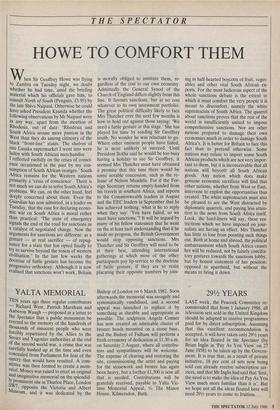THE SPECTATOR
HOWE TO COMFORT THEM
When Sir Geoffrey Howe was flying to Zambia on Tuesday night, we doubt whether he had time, amid the briefing material which his officials gave him, to consult North of South (Penguin, £3.95) by the late Shiva Naipaul. Otherwise he could have asked President Kaunda whether the following observations by Mr Naipaul were in any way, apart from the mention of Rhodesia, out of date: 'Rhodesia and South Africa arouse more passion in the West than they do among citizenry of the black "front-line" states. The shelves of one Lusaka supermarket I went into were laden with South African merchandise.. . I reflected ruefully on the crises of consci- ence occasioned in the past by my con- sumption of South African oranges.' South Africa remains for the Western nations pnmarily a 'crisis of conscience'. There is not much we can do to solve South Africa's problems. We can, on the other hand, feel deeply concerned about them. Even the Guardian has now admitted, in a leader on Tuesday, that the case for declaring econo- mic war on South Africa is moral rather than practical: 'The state of emergency signals the end of the road for sanctions as a catalyst of negotiated change. Now the arguments for sanctions are different: as a gesture — at real sacrifice — of repug- nance for a state that has opted finally to try to survive beyond the tenets of western civilisation.' In the last few weeks the doctrine of futile gesture has become the progressive orthodoxy. Although it is now realised that sanctions won't work, Britain is morally obliged to institute them, re- gardless of the cost to our own economy. Admittedly the General Synod of the Church of England differs slightly from this line. It favours sanctions, but at no cost whatever to its own investment portfolio. The great political difficulty likely to face Mrs Thatcher over the next few months is how to hold out against those saying: 'We need a futile gesture at this stage.' She has played for time by sending Sir Geoffrey south. No wonder he was reluctant to go. Where other eminent people have failed, he is most unlikely to succeed. Until President Botha said he would be too busy having a holiday to see Sir Geoffrey, it seemed Mrs Thatcher must have obtained a promise that this time there would be some notable concession, such as the re- lease of Nelson Mandela. For if the For- eign Secretary returns empty-handed from his travels in southern Africa, and reports to the Commonwealth leaders in August and the EEC leaders in September that he has achieved nothing, what is he to reply when they say: 'You have failed, so we must have sanctions.'? It will be argued by many of his fellow statesmen that he went on the at least tacit understanding that if he made no progress, the British Government would stop opposing sanctions. Mrs Thatcher and Sir Geoffrey will need to be at their best, attending international gatherings at which most of the other participants pay lip-service to the doctrine of futile gesture, if they are to resist placating their opposite numbers by join- ing in half-hearted boycotts of fruit, veget- ables and other vital South African ex- ports. For the most ludicrous aspect of the whole sanctions debate is the extent to which it must comfort the very people it is meant to discomfort, namely the white supremacists of South Africa. The quarrel about sanctions proves that the rest of the world is insufficiently united to impose comprehensive sanctions. Nor are other nations prepared to damage their own economies much in order to damage South Africa's. It is better for Britain to face this fact than to pretend otherwise. Some nations may refuse to import some South African products which are not very impor- tant to them, but it is inconceivable that all nations will boycott all South African goods. Any nation which does make genuine economic sacrifices will find that other nations, whether from West or East, intervene to exploit the opportunities thus created. The white supremacists must also be pleased to see the West distracted by diplomatic quarrels, and paying less atten- tion to the news from South Africa itself. Look, the hard-liners will say, these res- trictions which we have imposed on jour- nalists are having an effect. Mrs Thatcher has little to lose from pointing such things out. Both at home and abroad, the political embarrassment which South Africa causes her will be reduced, not by falsely concilia- tory gestures towards the sanctions lobby, but by honest statement of her position: opposed to apartheid, but without the means to bring it down.


















































 Previous page
Previous page